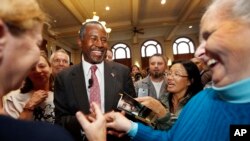Ben Carson's eye-popping summer fundraising haul of $20 million has not only reaffirmed his viability as a Republican presidential candidate, it has propelled him into a league of superstar fundraisers such as Democratic contender Hillary Clinton and President Barack Obama.
But unlike Clinton and Obama, Carson lacks access to deep-pocketed donors from corporate America and Hollywood who have been the traditional sources of massive campaign war chests of presidential candidates.
Nor is Carson following the traditional path of building his candidacy brick-by-brick through a prolific schedule of appearances in key early primary states such as Iowa and New Hampshire.
Instead, Carson has been building a huge, and loyal, digital audience. Close to half of the $20 million tally raised in the last three months came from online sources, Barry Bennett, Carson's campaign manager, told Reuters.
Carson's online fundraising strategy — similar to one employed by Democratic candidate Bernie Sanders — contrasts with the big-ticket fundraising events traditionally favored by presidential candidates.
Carson's $20 million outpaced the Republican frontrunner from the 2012 election, Mitt Romney, who took in $14 million over the same three-month period. And it was comparable to the amount Obama raised during his first campaign in the summer of 2007.
He was not far behind Clinton, a powerhouse fundraiser, who raked in $28 million over the last three months.
Face to face
While Carson is known for being quietly spoken on the campaign trail, he speaks volumes on the Internet.
Some online supporters are attracted to his compelling life story and his anti-establishment rhetoric; others simply because his daily presence on social media makes them feel more involved in his campaign.
Facebook has become Carson's chief weapon. While his Twitter following (692,000) pales in comparison to Clinton's (4.4 million) and Donald Trump's (4.3 million), the front runner for the Republican nomination, his Facebook page is the most popular in the entire 2016 race.
Carson holds brief chats every weekday evening and answers three questions from users. Rachelle Davis, one of more than 4 million Facebook users who have "liked" Carson's official Facebook page, said his daily "Ask Ben" sessions empower everyday voters who can't attend debates to have their questions addressed.
"He's not just putting out his political line. He's answering people's questions," the 46-year-old children's minister from Indianapolis, Indiana, said. "It makes people out here feel like they're important."
Carson's performance on Facebook in September exceeded that of other Republican candidates. He notched up more than 8.2 million "engagements," according to data compiled by NewsWhip, a social media analytics firm. Engagements consist of likes, shares and comments on posts. By comparison, Carson's nearest rival, Trump, generated about 6.3 million engagements.
Social media has buoyed Carson in other ways. Bennett said the campaign drew thousands to an event in Phoenix in August by simply advertising online days before the event.
"We got 12,000 people to our event in Phoenix in less than four days," campaign manager Bennett said, adding, "all I did was post it on social media."
Some skeptics
Still, Carson's fundraising prowess has skeptics, who say the campaign has spent money at a faster rate than other campaigns in an attempt to pump up its numbers. During the second quarter of the fundraising year, Carson spent 64 percent of the money he raised, more than any other candidate.
Carson's campaign has yet to disclose how much cash is left in its account.
Regardless of Carson's non-traditional approach, he will have to figure out how to leverage his online popularity into an organized effort in early voting states like Iowa, New Hampshire and South Carolina if he wants to succeed, said Patrick Ruffini, a Republican consultant who specializes in campaign analytics.
For now Carson trails only Trump in polls in those states, but he has spent little time there compared to some of his opponents. He has been traveling more widely to try to develop a national base of support. He has visited 37 states since announcing his candidacy, according to his campaign.
Carson is continuing to chase donors, both in traditional and nontraditional ways. He attended a $1,000-a-plate fundraiser in Chicago on Thursday and will be holding similar events in the coming weeks. But supporters can pay as little as $250 to share a meal with him in Knoxville, Tennessee, on Oct. 12 or lunch with him in Augusta, Georgia, three days later.
Carson's campaign said his small donors still have money left in their pockets. More than 250,000 donors have given to the campaign at least twice, but with the average donation just $51, they have far to go before they reach the federal individual contribution limit of $2,700.





